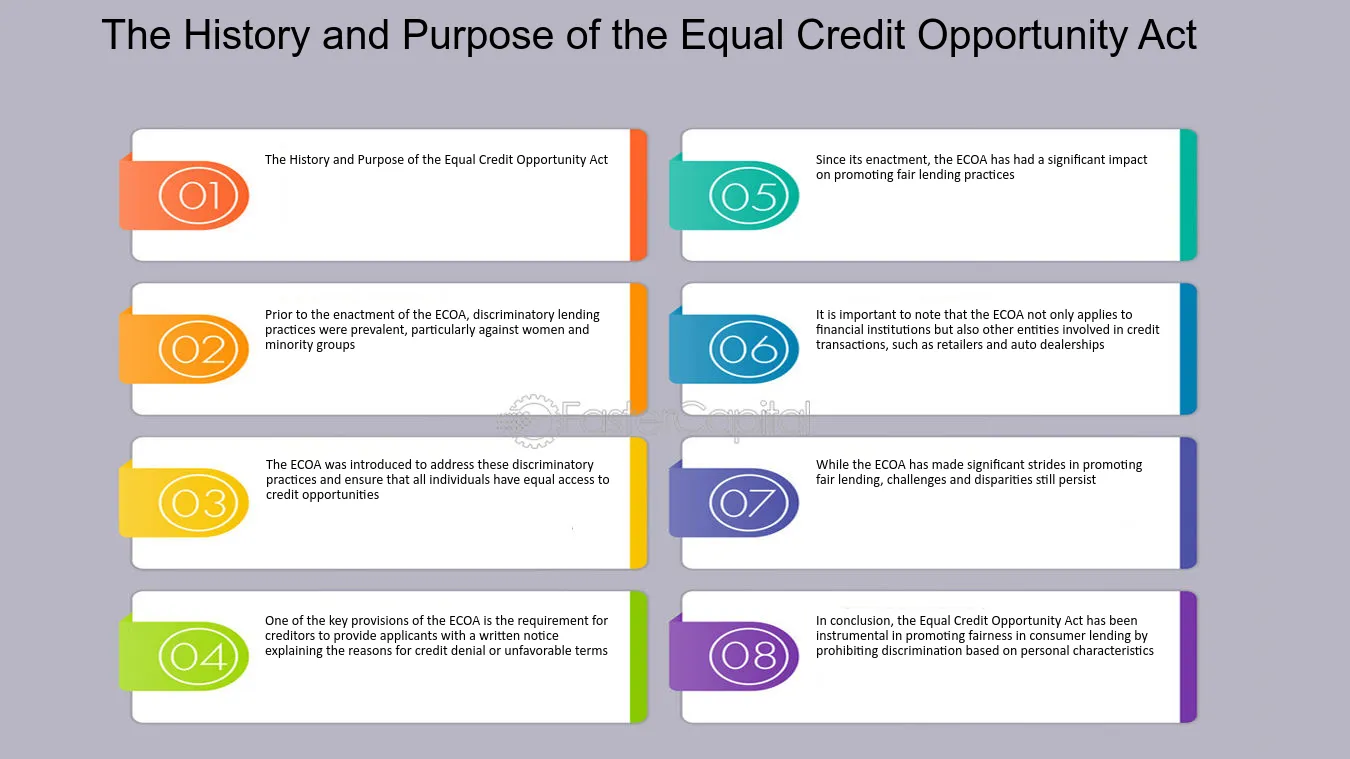Importance of the Equal Credit Opportunity Act (ECOA)
The Equal Credit Opportunity Act (ECOA) is a crucial piece of legislation that plays a significant role in promoting fairness and equality in the lending industry. The act prohibits lenders from discriminating against borrowers based on certain protected characteristics, such as race, color, religion, national origin, sex, marital status, age, or receipt of public assistance.
Another important aspect of the ECOA is that it promotes transparency and accountability in the lending industry. Lenders are required to provide applicants with clear and understandable information about the terms and conditions of credit, allowing borrowers to make informed decisions. This helps to prevent predatory lending practices and ensures that individuals are not taken advantage of.
The ECOA also encourages diversity and inclusion in the lending industry. By prohibiting discrimination, the act promotes a level playing field and encourages lenders to consider a diverse range of borrowers. This not only benefits individuals who may have previously been denied credit based on discriminatory practices but also helps to foster economic growth and stability.
Furthermore, the ECOA provides individuals with legal recourse if they believe they have been discriminated against. It allows borrowers to file complaints with the appropriate regulatory agencies and seek remedies for any harm they may have suffered. This helps to hold lenders accountable for their actions and ensures that individuals have a means to fight against discriminatory practices.
Key Provisions of the Equal Credit Opportunity Act (ECOA)
The Equal Credit Opportunity Act (ECOA) is a federal law that prohibits lenders from discriminating against borrowers based on certain protected characteristics. The ECOA ensures that all individuals have equal access to credit opportunities and are treated fairly by lenders.
1. Prohibition of Discrimination
One of the key provisions of the ECOA is the prohibition of discrimination in any aspect of a credit transaction. Lenders are not allowed to discriminate against borrowers based on their race, color, religion, national origin, sex, marital status, age, or receipt of public assistance.
This provision ensures that lenders cannot deny credit or impose different terms and conditions based on these protected characteristics. It promotes equal access to credit for all individuals, regardless of their personal characteristics.
2. Notification of Reasons for Credit Denial

Another important provision of the ECOA is the requirement for lenders to provide a written explanation to borrowers who are denied credit. If a borrower is denied credit, the lender must provide a written notice that includes the specific reasons for the denial.
This provision enables borrowers to understand why they were denied credit and allows them to take appropriate action, such as addressing any errors or inaccuracies in their credit history. It promotes transparency and accountability in the lending process.
3. Spousal Signature Requirement
The ECOA also includes a provision that prohibits lenders from requiring a spouse’s signature on credit applications, except in certain circumstances. This provision aims to prevent discrimination against married individuals, particularly women, who may have faced barriers to obtaining credit in the past.
By eliminating the requirement for a spousal signature, the ECOA ensures that individuals can access credit independently, without being dependent on their spouse’s creditworthiness or financial situation.
4. Enforcement and Remedies

The ECOA provides for enforcement by various federal agencies, including the Consumer Financial Protection Bureau (CFPB) and the Federal Trade Commission (FTC). These agencies have the authority to investigate complaints, conduct audits, and take legal action against lenders who violate the ECOA.
If a lender is found to have violated the ECOA, the borrower may be entitled to remedies, such as monetary damages, injunctive relief, and attorney’s fees. This provision ensures that borrowers have recourse if they experience discrimination in the credit application process.
Impact of the Equal Credit Opportunity Act (ECOA)
The Equal Credit Opportunity Act (ECOA) has had a significant impact on promoting fair lending practices and ensuring equal access to credit for all individuals. Since its enactment in 1974, the ECOA has played a crucial role in combating discrimination in the lending industry.
One of the key impacts of the ECOA is that it prohibits creditors from discriminating against applicants based on their race, color, religion, national origin, sex, marital status, age, or receipt of public assistance. This means that lenders cannot deny credit or impose different terms and conditions based on these protected characteristics.
The ECOA also requires creditors to provide applicants with reasons for denying credit or offering less favorable terms. This transparency helps individuals understand the factors that influenced the credit decision and allows them to take appropriate action if they believe discrimination has occurred.
Furthermore, the ECOA promotes the reporting of credit information in a fair and accurate manner. Creditors are required to furnish accurate information to credit reporting agencies and to correct any inaccuracies promptly. This ensures that individuals’ credit histories are not unfairly impacted by incorrect or misleading information.
Overall, the ECOA has had a profound impact on promoting equal access to credit and combating discrimination in the lending industry. By prohibiting discriminatory practices, promoting transparency, ensuring accurate credit reporting, and facilitating enforcement, the ECOA has helped create a more equitable and inclusive financial system for all individuals.

Emily Bibb simplifies finance through bestselling books and articles, bridging complex concepts for everyday understanding. Engaging audiences via social media, she shares insights for financial success. Active in seminars and philanthropy, Bibb aims to create a more financially informed society, driven by her passion for empowering others.
